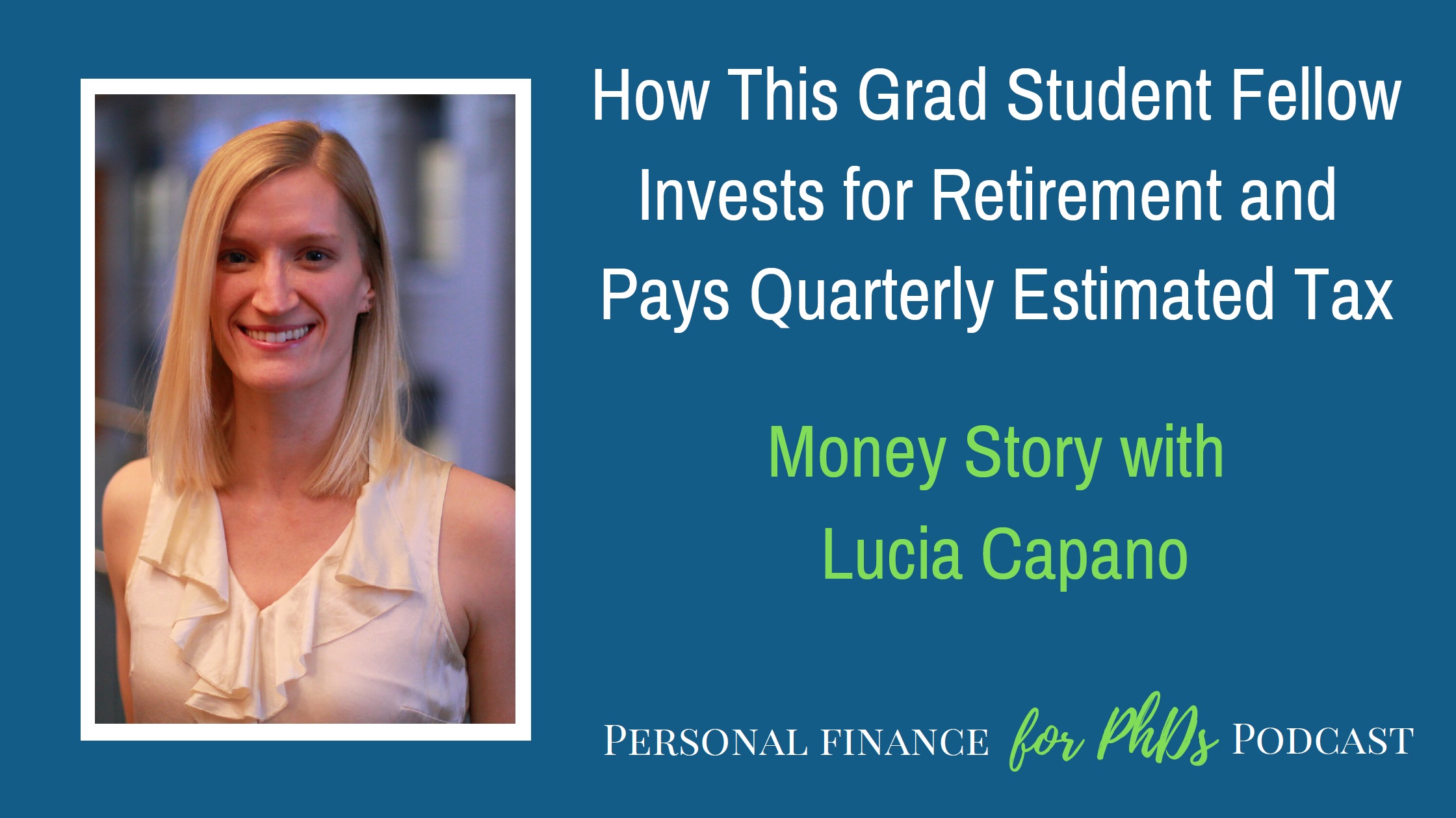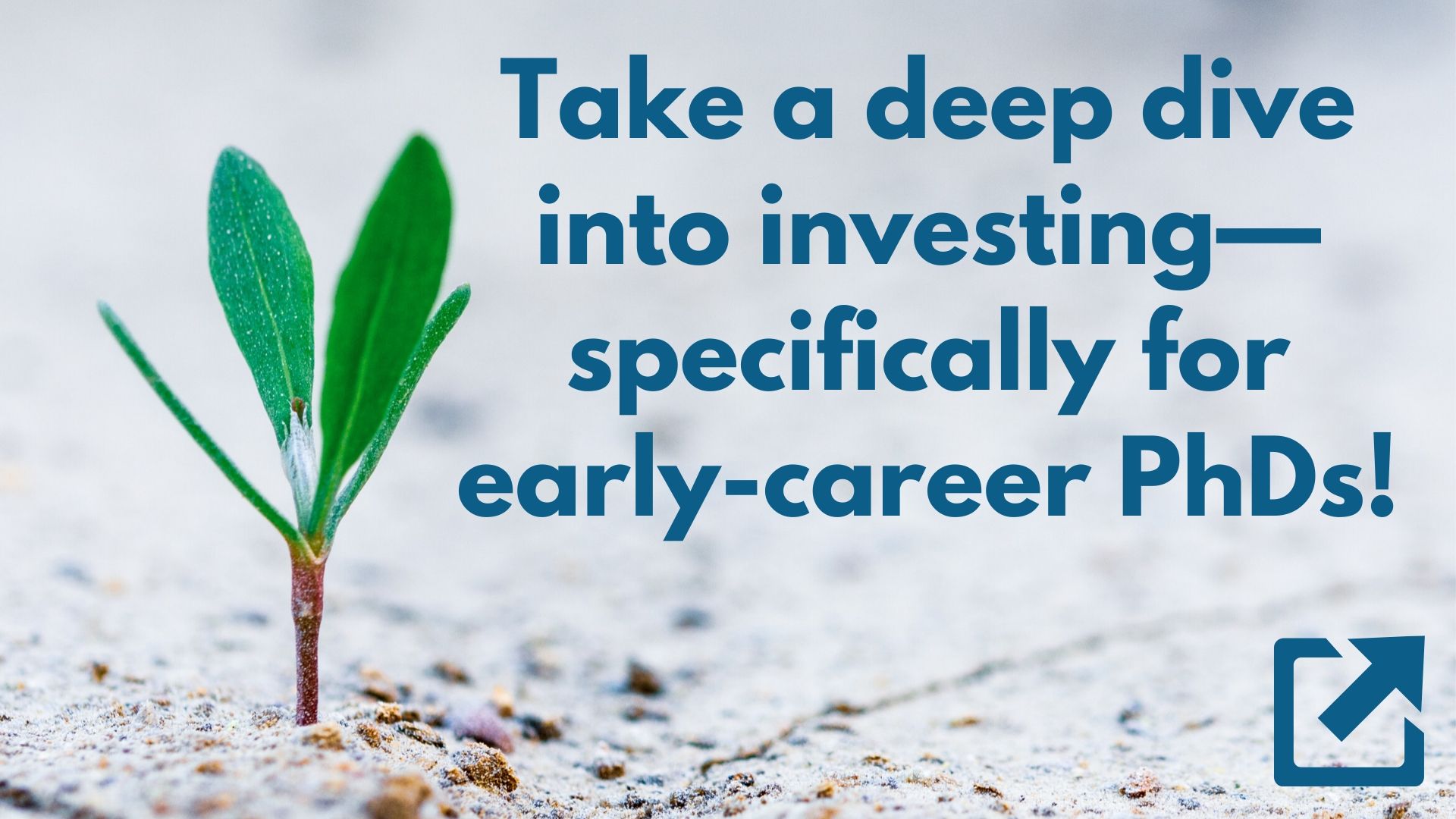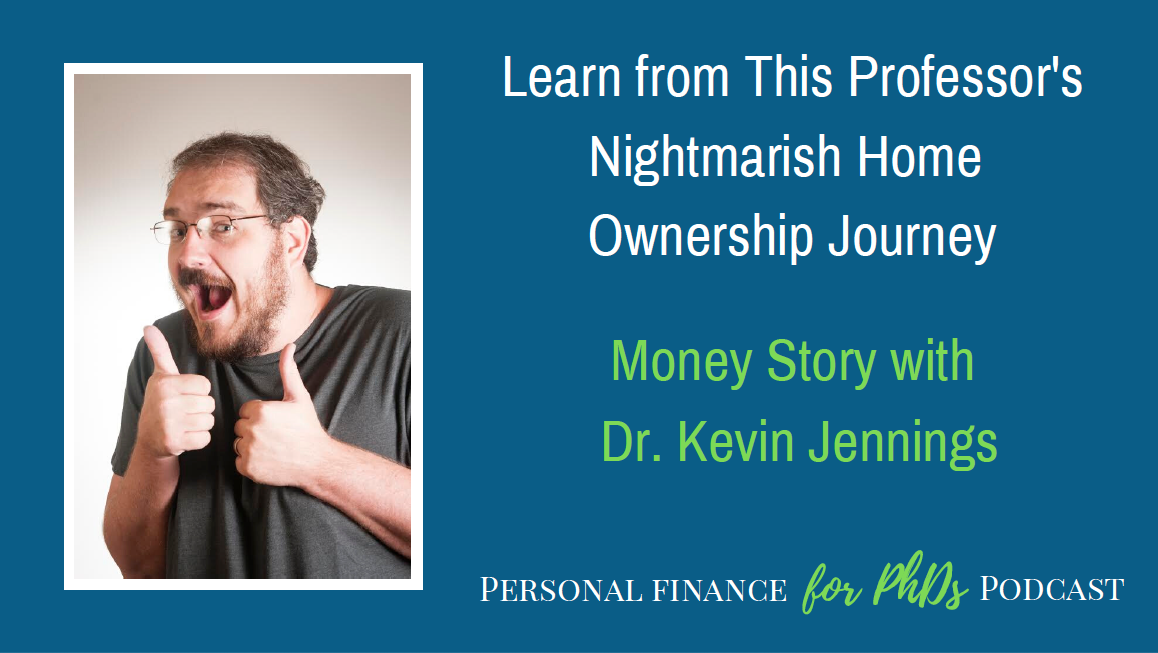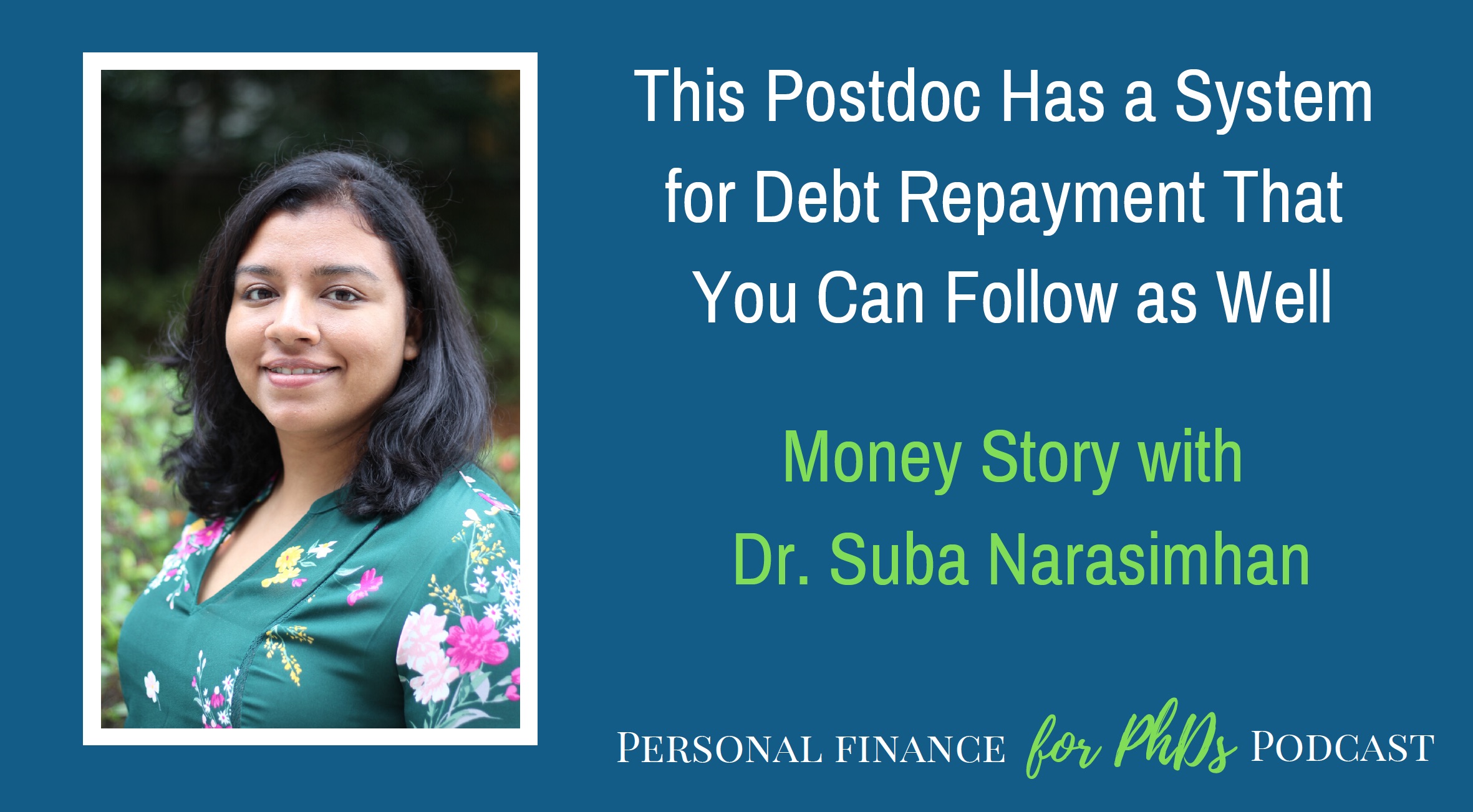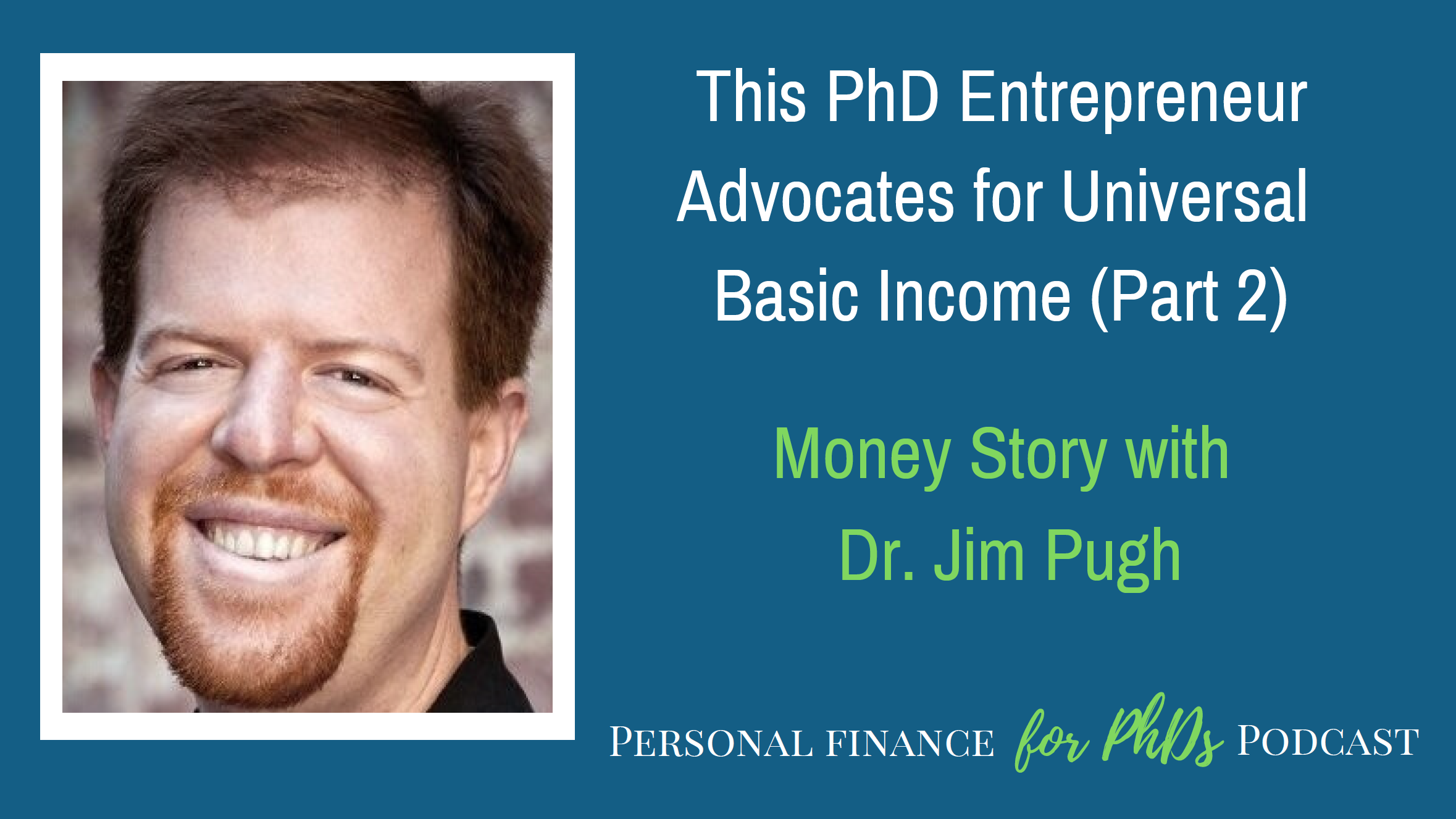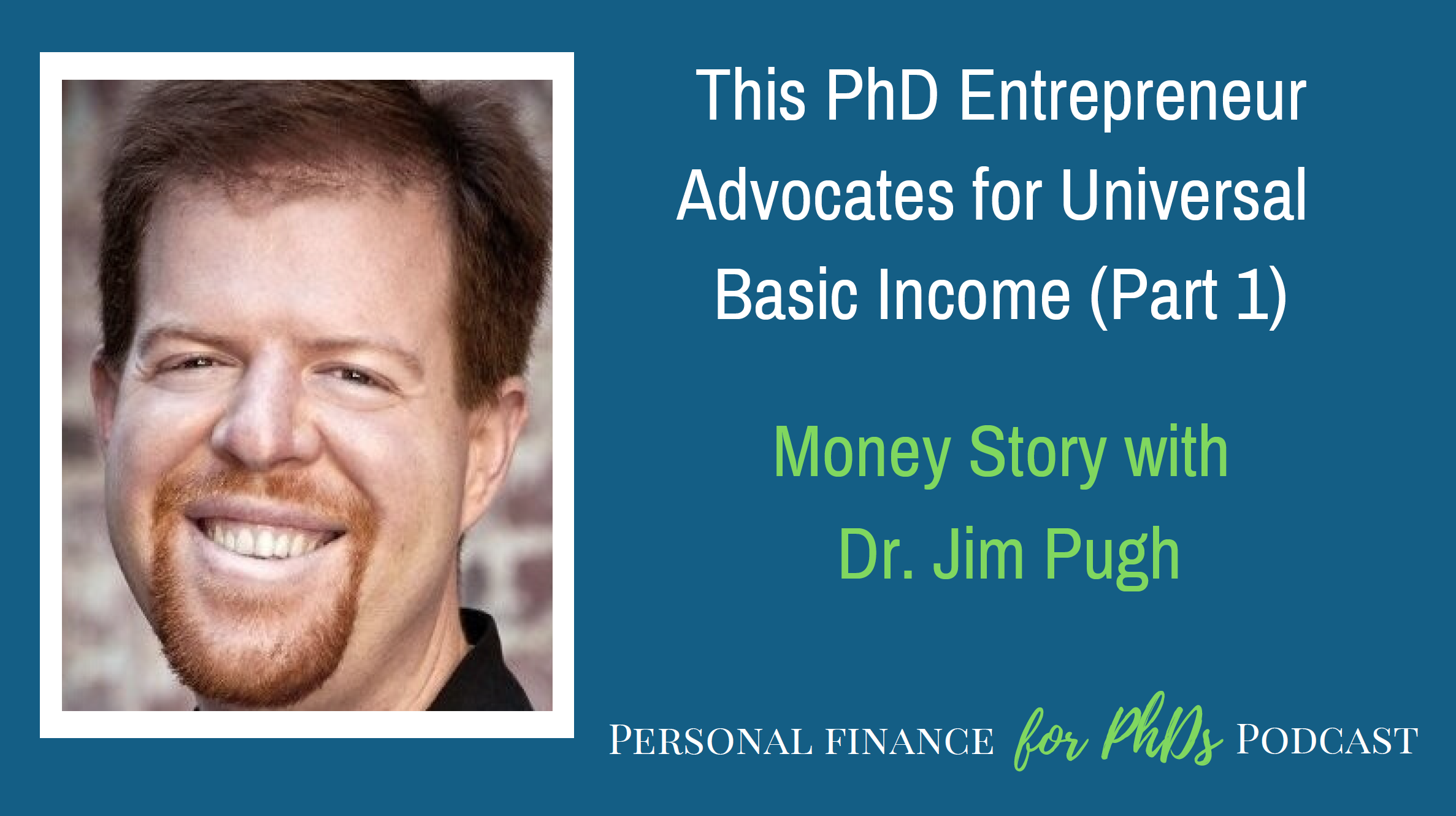In this episode, Emily interviews Dr. Abby Rainer, a PhD in organizational communication and Lean Six Sigma Black Belt. Abby’s dissertation focused on women in STEM careers negotiating their first jobs, and the expertise she brings to our interview is from her education, her research, and her personal experience. We discuss the correct way to frame your negotiation and why that’s challenging for some PhDs; the importance of considering all aspect of your offer, not just your salary; the similarities and differences between negotiating in academia vs. industry; and the biggest misconception people hold regarding negotiation.
Links Mentioned in the Episode
- Abby’s Udemy Course: Funding Graduate School
- Abby’s Udemy Course: Lean Six Sigma Green Belt
- PF for PhDs: Coaching
- @rainer_abby (Abby’s Twitter)
- Abby’s LinkedIn Page
- PF for PhDs: Podcast Hub
- PF for PhDs: Subscribe
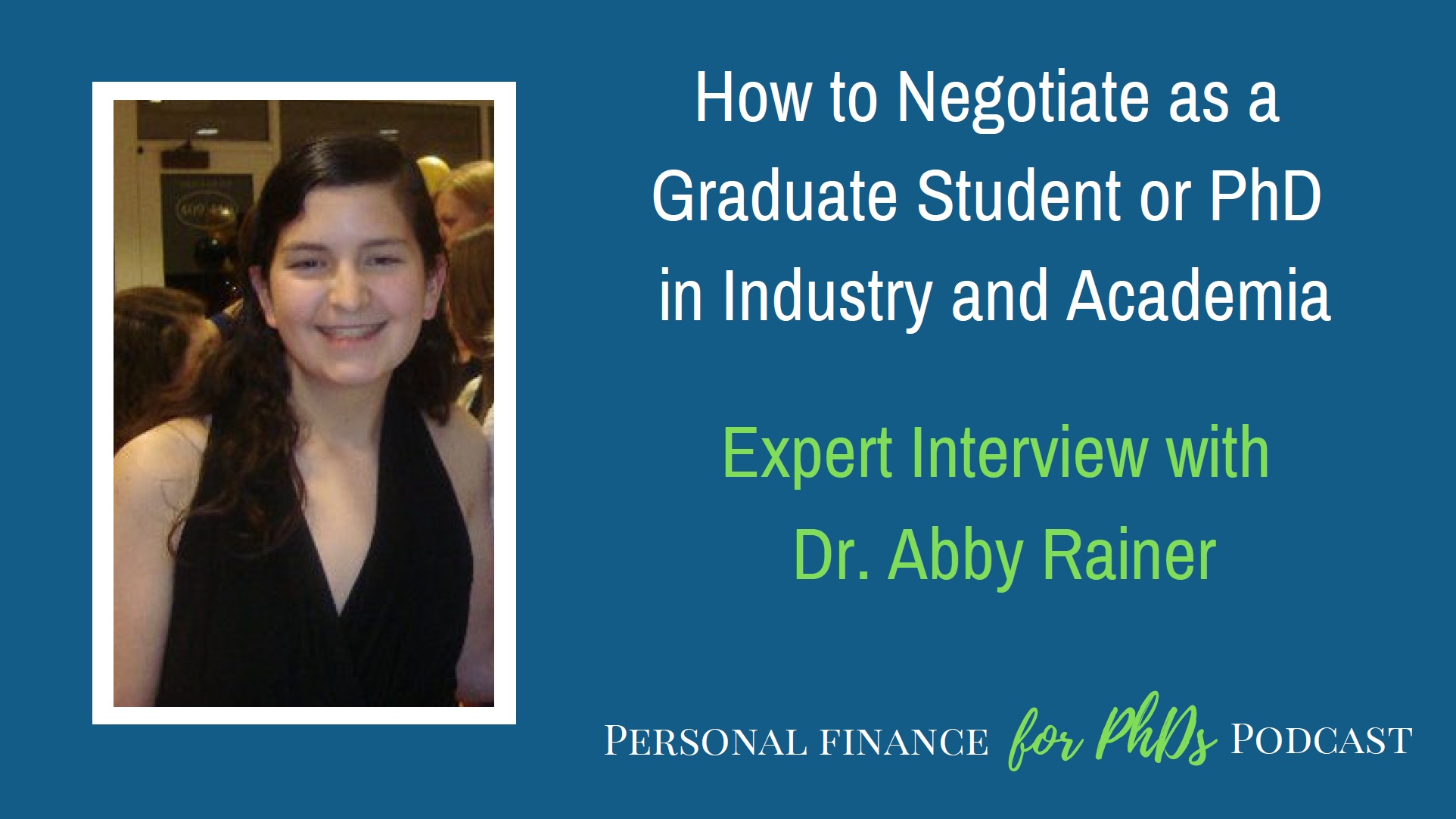
Teaser
00:00 Abby: Realizing that negotiation doesn’t have to be a one-shot, do or die, black and white kind of mindset. It can be over time. You will get many, many different chances to negotiate your worth or negotiate your package and everything.
Introduction
00:18 Emily: Welcome to the Personal Finance for PhDs podcast, a higher education in personal finance. I’m your host, Dr. Emily Roberts. This is season six, episode 11, and today my guest is Dr. Abby Rainer, a PhD in organizational communication and Lean Six Sigma Black Belt. Abby’s dissertation focused on women in STEM careers negotiating their first jobs, and the expertise she brings to our interview is from her education, her research and her personal experience. We discuss the correct way to frame your negotiation and why that’s challenging for some PhDs, the importance of considering all aspects of your offer, not just your salary, the similarities and differences between negotiating in academia versus industry, and the biggest misconception people hold regarding negotiation. This is a jam-packed episode that will be valuable for graduate students and PhDs at every stage of their careers. Without further ado, here’s my interview with Dr. Abby Rainer.
Will You Please Introduce Yourself Further?
01:22 Emily: I have joining me on the podcast today Dr. Abby Rainer, and we’re going to be talking a lot about negotiation and mindsets around that, particularly women in negotiation. I’m so excited for this topic, and Abby is an actual expert. This is related to her PhD work, and she now has a business related to this area. So, she’s going to tell us all a lot more about that. Abby, thank you so much for joining me on the podcast today. And will you fill our listeners in about your background?
01:48 Abby: Sure. Thank you for having me, Emily. I really appreciate being on here. So, to cover my background in a pretty brief term, I got my PhD from Michigan State University in 2018 and got a similar combination of a bachelor’s and master’s degree from Wake Forest. I got the master’s in 2015 and the bachelor’s at the end of 2013. So, I combined both of those degrees into five years just so I could hurry up and get onto the PhD.
02:14 Abby: I was cross-trained in several different areas that are relevant to today’s topic, including communication, industrial organizational psychology, management, human resources, and then education administration. And then areas that I trained on and did research on as well as other administrative work included areas like social support, stress, family planning, and some health topics. But then I also had a lot of business topics like specifically, if you are looking to negotiate your benefits and compensation packages. And then I looked a lot at STEM career trajectories. So, how women were flourishing and more male-dominated areas and the strategies they use to choose their careers and kind of how those paths sort of manifested for them. And then on top of, with my recent background, I have made courses for grad students on Udemy that cover areas like negotiating your benefits and compensation for grad school. And then also if they want to do more of a process improvement project on their finances, then they can find my green belt training there too, which covers a lot of very simple and straightforward ways to save money and document how you do that. It gives you a lot of tools on how to figure that out.
What is Your Udemy Site?
03:22 Emily: Yeah. Could you repeat the name of your Udemy site?
03:26 Abby: Sure. So, the Udemy is just a sort of, what’s called a MOOCs So, a Massive [Open] Online Course website and people can go to Udemy’s website and then they can just type in things like “grad school funding.” That would be a series of keywords that would bring up my training on graduate school benefits and compensation. And then they could also type in green belt, Six Sigma Green Belt, or Lean Six Sigma Green Belt and also my name. So, that should help them see where that pops up. I’ve only created one green belt training. I’ve not had more than one, so it should isolate that one particular training very quickly.
Abby’s Dissertation: Women in STEM + Negotiation
04:01 Emily: Oh good. Yeah, I wasn’t sure if it was going to be under like your name or like a business name or something. Abby, what’d you tell us a little bit in more detail, what was the subject of your dissertation?
04:10 Abby: Sure. So, I kind of in connection with what I was talking about earlier, I had done research on women in STEM careers and then work on negotiation in general. Like I gave some presentation work on hostage negotiation and terrorism, and this is a very different type of negotiation, but having a background, like a family background in finance, I kind of wanted to combine all those areas and some finance research I had done and specifically look at how women going into STEM careers, specifically their first STEM careers, how they negotiated not only their salaries, but really other types of compensation they could get like their health care packages, how much family time, like leave they had for, for instance, caring for children, and then other areas like bonuses and just work assignments as well.
04:56 Emily: And what drew you to that area? Why did you choose that for your PhD work?
05:01 Abby: I chose that because there was a lot of work that involved experiments, for instance, that created hypothetical situations, but these women were real-life women who had actually gone through actual negotiations in different companies across the United States. And so, I wanted to get a sense of reality. I wanted to see what women were actually going through and I collected a mix of quantitative and qualitative data. I used most of the quantitative data for the PhD sort of dissertation part, but I also created a series of questions in the survey that looked at, for instance, what were the descriptions of the negotiations actually happening, like who was involved in the negotiation? Did they say anything that was maybe discriminatory or that showed some sort of bias toward the women? And so, really looking at those areas, I started to pull some data on things like how much training impacted different outcomes, like how much money women were thinking of walking away with, or how much they actually walked away with.
05:59 Abby: And then I also looked at about 20 different benefits that women were able to get during negotiations, like a series of negotiations, and which ones they tended to get, so I could isolate different trends as to what people were more likely to walk away with other than just the salary being increased.
06:16 Emily: Yeah. I love that you actually took this forward into, let’s not just look at what’s going on, but what interventions are possible to actually help the situation a bit. That’s great. And I’m sure that we’ll talk more about that in a minute here, but just for the listeners. I mean, Abby obviously is an expert in this area. She has a lot to say, so we’re going to move really quickly through a few different questions in this interview. And if you want to follow up with her, which I imagine many of you will want to, check out the website that she already mentioned, her courses and so forth, and you’ll get a lot more of the content there.
Role of Mindset in Negotiation
06:48 Emily: So, okay. I have been talking more and more recently about mindset and about its importance in personal finance. And I know that you also know something about mindset with respect to negotiation. So, what role does mindset play when you’re going into negotiation?
07:07 Abby: I think that mindset has everything to do with not only how confident you are, but also how effective you are. And you have to monitor how you are coming across in an interview so that you have to develop that sense of mindfulness. That way you can do what’s called pivoting. So, pivoting will be that you notice that someone’s not responding particularly well to a negotiation tactic, like using too much silence, for instance. You can turn the conversation around and ultimately start executing a series of steps based on that reaction to get what you want. So, you have to really stay in the present with the conversation, that way you’re able to assess the situation ongoing.
07:40 Abby: And you’re just able to create new strategies or choose ones that you already have in mind as you go along and just keep responding to what’s there, not what’s going on in your head and not what you think should be happening.
How Can PhDs Overcome a Scarcity Mindset when Negotiating?
07:50 Emily: I see. So, kind of what I’m hearing is what happens in negotiation is not totally set, linear, this is the exact script kind of path. And you have to be kind of adaptive to what is going on in the situation. And how can a PhD–like I know a lot of PhDs come into this whole post-PhD career thing with a lot of hangups that they developed in graduate school, around money and around their worth and so forth. And, you know, we might even call this like a scarcity mindset, or like a poverty mindset. And so, how does a PhD set that aside when they’re going into a negotiation? Like how do you actually overcome that if that’s what’s happened during graduate school?
08:31 Abby: I think that one really good way to look at it, especially if you were going into a non-academic job or if you were going into your first professor job and you’re not really sure, kind of where you stand compared to other people is, think through how to calculate and communicate your ROI or return on investment. That’s a very important business term not a lot of PhDs really think about or know how to calculate or communicate. But whenever you’re in a negotiation, let’s just say, I’m going to use a real life example of mine. I was interviewing with a major retailer, specifically in the jean sector, once for a job. I had to fly out to a different state to do that. And as I was there, I talked with, I think about 10 to 20 people.
09:11 Abby: And just one day, I had a series of individual meetings with some people, like higher-level directors, and then a larger lunch with a smaller group of people who were lower-ranked. I think they were maybe talent recruiters or something. And so, what I learned while there was that people wanted to hear how you were able to contribute to the table in ways they understood. So, with that particular case, I was interviewing for a jean company. So, some language to use when communicating my ROI would have been things like “best-sellers.” Like if I wanted to predict who was going to be engaged in a company over time, so looking at employee engagement, how to improve that, I could say the five best-sellers or in more or less research terms that grad students might understand, the five predictors of work engagement would be, let’s just say supervisor quality and four other things.
10:03 Abby: So, learning how to speak in ways that people in industry understand that don’t necessarily rely on statistics, because a lot of them don’t really know very much, if anything, about statistics is a good idea. And you can apply that mindset too if you’re applying to academic jobs like being a professor or a postdoc. You just have to know, for instance, let’s just say for ROI, you wanted to calculate how much grant money you’ve brought to the table when applying for different grants, or how many students you’ve taught, or ways that you’ve saved the university money. Other things like those can be communicated in a way that’s specific to your department or organization and what they care about. So, match what you’ve done to what people care about, and communicate it in a way that uses industry-specific language that they understand. And you should be good to go and sort of like start to defeat that poverty mindset over time. Because you can physically see–you can’t really contradict numbers in that case–you can see on paper, “Okay, I’ve done a hundred thousand worth of grants in one year. That’s a lot of money.” So, just starting to visualize that, but also learn how to be precise is important.
Focus on Thriving, Not Just Surviving
11:07 Emily: Yeah. What I’m hearing you say in this portion is like, I think part of the problems, and these are universal outside of academic training or whatever. Some people, a lot of people come into a negotiation thinking, “What do I need to survive? What kind of salary do I need to command to have the lifestyle that I want?” And coming out of graduate school, it’s probably not a high number because you’ve probably been living on a pretty, pretty low salary for the last several years. And you’re reframing this not as, “Okay, well, what do I need to get by?” But rather, “What value am I bringing to this organization? What metrics, what proof points do I have to back this up?” And also the further step of, “I need to communicate this to them in a way that they’re going to latch onto and appreciate,” not necessarily your most natural way of communicating. Does that sum up what you were saying?
11:55 Abby: Absolutely. And what a lot of people have to think about is not really putting themselves of “How much money do I need to survive,” but, “What is my, what’s called, market value?” So, when you look at market value, it’s a completely different mindset from what you’re taught in grad school, because the norms in your particular field, like if you’re going into tech, the norms for salary and benefits will be different they. Somewhat depending on the company, but also compared to other industries. Like if you work in manufacturing. So, you have to just consider those differences. But also you have to think of the whole negotiation as a win-win mindset. So, it’s not just about what can I get from this company. You have to think about me, myself, and family, because realistically speaking, and I know this is kind of harsh, but a lot of people, and especially in HR, will, if people say something in an interview, like “I need this much mind to live,” unfortunately they’ll just tell you perhaps even bold facedly, they don’t care, you know, what you need to survive, which it knows is harsh and I would never–I’m in HR.
12:48 Abby: So, I would never say that to an applicant. But really the company just cares about what you can bring to the table, because the implication of you bringing things is that they will take care of you in turn. So, you don’t really have to communicate, “This is what I need.” You have to show them based on, for instance, your certificates, what your capacities are, just different software and other skills that they find relevant. You can use all of that to get more money because you are clearly bringing more to the table. They’ll be generally more willing to pay for all those skills. Because especially, at least in my case, for instance, I bring a lot of really rare skill sets to my particular job. And I got that job through a contract. And so, you know, just being able to show what all you bring that will help the company give you the money and you won’t have to worry about surviving as much. You’ll be able to think about thriving, which is completely different, as far as the psychological response goes. Survival schools, more of grad school, it’s just the bare minimum. What can I possibly scrape by? With industry, you should present yourself as what can I do to thrive and help people at work thrive and just kind of frame it like that.
Big-Picture Negotiation Items Besides Salary
13:47 Emily: Yeah, so this is really, you know, taking a step back from being very me, me as the applicant, very me-focused and more about what am I bringing to this organization? What other big-picture items should applicants be thinking about when they’re going into a negotiation process?
14:02 Abby: I think that one of the big ones that a lot of people don’t really particularly talk about, and sometimes I’ve heard in even other podcasts, maybe discourage a little bit, is thinking about what’s called the total reward lens. So, the total reward lens, if you think of the big pie, for instance, like the kind of pie you can eat, not the number. If you think of a pie and you think of all the possible pieces that could come out of it, those are all interrelated, but they’re also their own separate entities once they’ve been cut out of the pie. So, they’re able to be standalone items. Whenever you think of a total reward lens, whenever it comes to getting what you want from work, you have to think of that kind of like a pie, too, because salary is naturally going to be a big part of that pie for a lot of people. But you also have other pieces of the pie like your healthcare, which projects you can work on, the quality of your supervisor.
14:51 Abby: And then some other areas like how much autonomy do you get? Or how much natural light does your office get? And those pieces of the pie in terms of their size or their weight, depending on how you want to think about it, are all different for different people. So, you have to think about, “If I were to make my ideal pie, what would that look like in terms of where all the pieces are and how much those matter relative to the overall sort of picture that I’ve got going on?” Because different people are going to have different needs. If you’ve got a parent who’s got young children, then maybe flexibility might be more important for them. Or if you have someone who’s more into work-life balance, like they want to go ski on the weekends, then that might be very important to them, too. But it might not be as important to someone who maybe like myself is single and doesn’t really have to take care of kids, at least right now. So, it really depends on your specifics. So, you just have to like define those numbers for yourself, but also realize if you don’t get a bigger part of the pie focusing on salary, maybe you could get a bigger part of the pie that would focus on another area or two or three other areas that you also care about.
Is Everything Open for Negotiation?
15:53 Emily: Yeah. I think this is an area that people definitely don’t pay enough attention to. Like you were saying, it’s kind of all about the salary, but there are so many other aspects to your benefits or just your work culture and work style that should play into your decision about which kind of job to accept and also what to negotiate. So, would you say that is every piece of this pie up for negotiation? Or like where might one focus your negotiation if you’re not quite happy with all the different pieces?
16:22 Abby: A lot of it depends on the type of job you have. So, for instance, if you are working in a government position that is governed by a shared contract, like a collective bargaining agreement, for instance. Then certain areas of your package, like the initial salary may very well not be negotiable. I actually had to tell, whenever I was hiring people, several individuals who applied, this is part of the collective bargaining agreement. You can’t negotiate it. Over time, you can perform better and get a bonus that way. But at least with this contract, your salary, at least your base, is set. So, if you want to get more money over time, it’s really on you. You have to perform in terms of exceeding expectations. And then you can get more money that way. You can also get other money by doing other tasks that the job would be open to.
17:08 Abby: So, for instance, if you did overtime, that might be something that you’d be able to get more money from, but it again depends on whether that’s available. So, those are some examples of what all you could do besides money. And then, of course, you have to think about too, what other options are available? And most places have a lot of different options when it comes to healthcare. For instance, you might have a lower deductible, and that works for you whenever it comes to healthcare, compared to someone else who wants to have a higher deductible. Or you might want to put more money in your 401k, like a retirement account, or, you know, the company might match whatever you do put in. So, you just have to look at/get sort of an initial view. If you can, if there’s an employment handbook, that will usually tell you different things like the possible packages available, the benefits, like maybe gym membership.
17:53 Abby: So, try and look there first. And usually those come through websites, they might be coming through HR. Like HR might directly send you them. Once you get your initial offer letter, just take a look at not only the offer letter, but the information they send over through those handbooks. A lot of people don’t even bother to look at those handbooks, but they’re very useful. So, I would just say, take a survey of what you’ve gotten initially. And then if you’re not happy with something, think about, “Okay, what could I bring to the table in terms of ROI to argue why I should get that thing?” So, it’s not like, most places are not going to have a huge conversation about negotiating healthcare. You go on and enroll yourself. So, that’s kind of a proxy for negotiation, but if it’s something like maybe extra days off, you would want to be able to come up with an argument to justify that. Personally, from an HR standpoint, I wouldn’t start from the job like day one saying, “I want more hours off.” I would wait until over time, maybe six months once you’ve had a little bit of tenure there, to propose that. But it just really depends on your situation. Try to take into account whatever information you do receive. And if you have questions, of course, ask at that time into your discussion, depending on your situation.
Commercial
19:04 Emily: Hey social distancers, Emily here. I hope you’re doing okay. It took a few weeks, but I think I have my bearings about me in my new normal. There is a lot of uncertainty and fear right now about our public and personal health and our economy. I would like to help you feel more secure in your personal finances and plan and prepare for whatever financial future may come. You can schedule a free 15-minute call with me at pfforphds.com/coaching to determine if financial coaching with me is right for you at this time. I hope you will reach out, if only to speak with someone new for a few minutes. Take care. Now, back to our interview.
How Employee Training Benefits the Employer
19:50 Emily: I want to mention one of the things that my husband actually negotiated for when he took his current position was, I guess you would call it, like training. So, like professional development. Maybe it’s something like, it’s not clear whether that actually like increased, you know, what he was going to get anyway, but it made it more explicit to his employer that he was looking to advance his career. And this is how he saw, you know, that he wanted to do it. And they said, “Yes” to it. Like, “Yes” to his proposal. So, I would imagine that would apply in a lot of other places, maybe where negotiation on salary or something else is a little bit more rigid. But you know, you can set yourself up right from the beginning to, you know, to seem like a go getter, right? You’re going for a promotion like right away, you know, you’re eager. You’re going to be growing your career. You want to grow with that company and how can they help you do that?
20:37 Abby: Right. And one of the things that you want to communicate whenever you’re proposing for something like more training is what kind of value that would also bring to the company, because that will set you up. For instance, one of the trainings I received during my government job, my last job, was that I was able to become a Lean Six Sigma Green Belt and a Lean Six Sigma Black Belt. And a lot of people might not know what those are or what they mean in terms of quantities, but in the process improvement area and finance and some other areas, those are very well sought-after certifications for people to have. And you can bump up your salary over time by anywhere from 5,000 with green belt to maybe 20,000 plus with a black belt.
21:13 Abby: But at the same time, you’re also able to save companies a lot of money because you’re able to go in, create change interventions, lead people through those interventions, and then identify ways that your group can maybe devote money to other resources. Like if you’re spending too much on training, for instance, and you could maybe cut costs or reallocate those costs, then maybe you can use that money to give people higher bonuses or something to that effect. So, as you’re proposing that increase in training, definitely make sure to communicate how that would benefit the company too, because in some way, shape or form, it probably will. You just want to make sure that people understand what that is from a very early standpoint. That way, you can frame your training as, “Okay, I propose there are five key goals that I’m going to get out of this. I’m going to go in, get those and I’ll show my team whatever those things were.” That way I can make sure I’m consistent with what I promised.
Negotiation in Academia vs. Industry
22:00 Emily: Excellent. So, I imagine we have people in the audience who, you know, they’re hearing your talk and you’ve mentioned industry a lot so far. But many of my listeners may be, you know, gunning to stay in academia. So, is the process of negotiation different, the same between those two different types of workplaces?
22:20 Abby: I would say that some of the behavioral norms and perceptions are very different. Because when I was in academia, I was in grad school and then I negotiated for my negotiation packages, like my benefits and compensation packages. And so, the first time I did it, wasn’t really negotiable as we were kind of on a collective bargaining agreement. Again, meaning that we all just had the same benefits and compensation. Like our stipends were all the same, and there wasn’t really a step-raise as much. But a lot of people in academia can negotiate quite a lot, too. And I would say that one of those critical parts of you negotiating, whether you’re a faculty member or a grad student of any level coming in, is that make sure you go do a campus visit. If you’re not invited to, definitely make sure you go do one. Because you want to get kind of a survey as to what your office area might look like, what the different resources like laboratories for instance are or libraries, and really how the people are, too, and kind of how everything is arranged. Because what I’ve noticed over time is that the way a department is arranged in terms of its space, its people, and its resources will tell you a lot about how you’ll fit well there or not.
23:23 Abby: So, for instance, I went to whenever deciding between two different PhD programs, I decided which one based on the visit that I went to with each one. So, whenever I went to grad school A, Choice A, I noticed that for instance, the offices had no windows whatsoever. And that’s very common in a lot of places in academia, especially if you’re in a much larger, more kind of cloistered building. And I was thinking, I’m definitely the kind of person who needs natural light. And that might not sound like a big deal to many people. But when you’re in an office for three years, constantly working on high-stress projects, maybe dealing with students who have a lot of problems and then other people who come in with different requests, you want to make sure that you have an office that’s inviting to at least some extent.
24:08 Abby: And so, I thought a natural light kind of office would be better for that. That wasn’t as big of a pie piece. Getting back to my pie analogy earlier, compared to the travel stipend that I got, for instance, but it definitely was important. So, use the visit that you get to kind of determine what you need to negotiate and think about because you can actually get a lot more by going to visit. Because whenever I went to visit, I got an extra, I think it was 4,000 at the start, from Place A compared to Place B just by contributing during the discussions that people had about, you know, why you want to become a grad student here and so on. And you’re able to meet people and add value to them. And that’s the key thing is make sure you add value that way. People are more likely to give you things in return because you can leverage that powerful principle of social reciprocity, which is if someone gets something from you, they’re more likely to give back in return.
Virtual Campus Visits
24:56 Emily: So, we’re recording this on March 23rd, 2020. And I think all PhD grad visits are probably off at this point for the remainder of admission season. Now, we’re actually going to publish this episode, I think after April 15th. So, after all the decisions have been made. But I’m just thinking about for students in this current situation, or maybe in future years when a visit is not possible for whatever reason. Of course, it’s ideal, but if it’s not possible, how can an applicant as a graduate student, or even at a later stage, get a sense of these things remotely, somehow? What do they need to do to create a facsimile of an actual visit?
25:36 Abby: Sure. So, there are different options. And I think that departments, if any faculty are listening, I would highly encourage them to explore this option. I’ll really just lay out two quick options. One would be to see if there’s any way–some departments already do this, depending on the school and the department you’re in, some don’t. Some departments offer digital tours. So, if students cannot come for whatever reason, they might have someone doing kind of a vlog of the laboratory, that might be something that’s interesting and valuable to you. And maybe you can live tweet them while you’re doing that. It really just depends on who all is leading that. Another option would be to, and you probably should do this in addition to option one, if you can. But another option would be definitely talking about your office setup and other things with faculty and grad students. Grad students would be more likely the safer option whenever it comes to communicating about what their offices are like. Faculty may very well not know anything about what current grad students are doing with their offices.
26:28 Abby: A lot of places do publish things about their grad student groups. Like who’s the president, VP, finance person, so forth. I was the finance chair with my group. But try to get out to reach that person, and they will probably connect you. If they don’t know something, they will connect you with someone who does. So, I would follow those steps. And then also just if the place has a Facebook group, for instance, definitely see what all people are taking pictures of there. And really over time, I would just say, try to ask a lot of really good questions. Because faculty and grad students love it when someone not only praises their work that they’ve been working on, but they have a mutual interest in, but also they appreciate someone who asked really thoughtful questions about things that they care about, too. So, I think if you frame it still as a win-win, like I’m giving this person a valuable, interesting conversation and they’re giving me information in turn that’s useful, I think that that will help you come across a lot more effectively. Because email conversations were very instrumental for me, too, whenever applying to grad school and deciding between different schools as well.
Misconceptions Around Negotiation
27:25 Emily: Yeah, I think if at all possible those conversations should happen over the phone or over video conferencing. Just because if a grad student, for instance, has anything not so nice to say about their department or their advisor or their group or whatever, they’re probably not going to want to put that in writing. So, it’s much better to speak live and not in a recorded fashion when you’re having those really candid conversations with current graduate students. So, thank you so much for those thoughts, Abby. And finally, can you clear up any misconceptions for us around negotiation and negotiation strategies?
28:03 Abby: I think that one of the biggest ones that I didn’t really think about early on, but started to realize over time, and then of course in retrospect, see a lot better is that a lot of people worry about negotiation if they don’t get it right the very first time–like their first semester right as, for instance, they’re getting into grad school or right as they’re becoming a professor or an industry professional–that they’ll never be able to do negotiation over time, or they’ll never be able to get it right. So, there’s that kind of fixed mentality of, “If I don’t get it now then I never will.” And that’s not necessarily true because the truth is that your job is very dynamic over time. People change. Sometimes departments get reorganized as we’ve seen more lately, whether you are in academia or in industry. Sometimes entire companies get reorganized to where their benefits and compensation structures change.
28:46 Abby: So, always be aware of what’s going on in your organization or in your grad school or your department, if you’re a faculty member or person wanting to join that. And just keep aware of the changes going on. That way, you can see different opportunities. Also make sure to realize that you are still, no matter where you are in your career, adding some sort of value, like a service, to your department or a company, for instance. So, keep abreast as to what ROI you are bringing to the table. And you can even keep, for instance, like a shout out sheet. I know a lot of people will use that. So, it’s like a list of all those accomplishments you have, what value that’s added, like making employees more engaged or improving organization, like even organizing a closet or like an area of the office where people store papers or files can be very useful. That may or may not be in your job description, but it depends on your situation.
Negotiation Can Happen Over Time
29:36 Abby: So, just realizing that negotiation doesn’t have to be a one shot, do or die, black and white kind of mindset. It can be over time. You will get many, many different chances to negotiate your worth or negotiate your package and everything. Because for instance, whenever I went into grad school, the grad school I chose for my PhD program had a lower stipend than the one that was offering me a package in return. And the reason I chose that other one was just that it really seemed to fit more with what I was hoping to do regarding the research methods path I wanted to go on, regarding the kind of set up of the department, and some other factors. But what happened was that over time I actually got, I think it was 15,000 extra dollars from that department during my three years there because I got 3,000 extra dollars in conference funding that I didn’t even have to apply for. The department chair just told me I qualified for it based on how I was a domestic student.
30:31 Abby: There were other things like consultant contracts which I was able to get and work on that brought in extra money. And then there were some other things too, like dissertation grant money that I got a lot more of there than I would have at the other place. So, I actually ended up kind of starting from a lower place at that Choice B university or not really Choice B, but Option B, and then working my way up to where I got actually a lot more money, pretty much almost a year’s worth of extra money, for only going three years. So, it doesn’t have to be like a one shot kind of picture. You just have to think over time, how can I find ways to negotiate? And if people want to read an area of IO psychology that deals with this a lot too, but not necessarily in money terms, they can look at what’s called the job crafting literature. And so, job crafting will show you different opportunities that you have to negotiate and it’s got four different categories and several of those papers. Very useful.
Where Can People Find You?
31:24 Emily: Yeah. Thank you for that tip. And speaking of, you know, where to go more, can you just mention again where people can find you if they want to hear more from you?
31:31 Abby: Sure. So, other than my Udemy course on negotiating your funding for grad school and then on another for Lean Six Sigma Green Belt, which shows people how to save money, people can also go to Twitter. My handle is @rainer_abby. And then they can also go to find me on LinkedIn a lot. And it’s just Abby Rainer PhD Lean Six Sigma Black Belt on there. So, those are the main places right now that they can go.
Best Financial Advice for an Early-Career PhD
31:59 Emily: That’s excellent. Thank you so much. And I always conclude my interviews with this question, which is what is your best financial advice for another early-career PhD? And it could be something that we touched on today in the interview, or it can be something completely different.
32:13 Abby: I would say that my best financial advice would be, and one of my early advisors told me this as well, is that if you do anything regarding finance, make sure to get it in writing and to make sure it’s in very clear writing. Because sometimes especially if you’re in a company or in grad school, people will promise you things like working on projects or grant money, but they might not be very upfront about it, or very clear as to when you’ll get that money, how, and so forth. I break a lot of this down in my Udemy training on funding for grad school, but just make sure that you get everything–the who, what, when, where, why and how–very clear, because you want to know exactly where your money’s coming from, why you were getting it, how it’s going to be dispersed to you.
32:56 Abby: And if you need to return part of that for any reason, like if you’re writing a grant, how you do that. Just so that everybody is very clear about what expectations are and there’s no fuzzy area regarding what needs to be done and by who.
33:09 Emily: Yeah, I think that’s excellent advice. And it’s also not even necessarily people being like underhanded and like purposefully leading you on or whatever. Sometimes people are just forgetful. And especially, you know, like in graduate school, faculty members, they’ve got a lot on their plates, so it really is better for all parties to be really clear and put it in writing, as you said so that everyone’s on the same page about what’s going to happen and when and so forth. So, thank you so much for that advice. And thank you for this interview, Abby.
33:36 Abby: Yeah. Thank you for having me. I really appreciate it. And I hope that people find this very useful because I didn’t know any of this before grad school or my time in academia. And some of it, I didn’t even know before my time in industry, but now that I’ve kind of been in both worlds, I see a lot of things that maybe I wouldn’t have before. And they can do that, too. It’s not just, you have to have a background in finance. You can do it regardless of where you’re from.
33:58 Emily: Absolutely. Negotiation is a topic that I don’t know as much as I would like to know about it. And so I’m highly interested in getting more of this content out to my audience. So, thank you so much for providing it.
34:08 Abby: You’re very welcome. Thank you. I appreciate you having me and hope everybody does well.
Outtro
34:13 Emily: Listeners, thank you for joining me for this episode. Pfforphds.com/podcast is the hub for the Personal Finance for PhDs podcast. There you can find links to all the episode show notes and a form to volunteer to be interviewed. I’d love for you to check it out and get more involved. If you’ve been enjoying the podcast, please consider joining my mailing list for my behind the scenes commentary about each episode, register at pfforphds.com/subscribe. See you in the next episode! And remember you don’t have to have a PhD to succeed with personal finance, but it helps. The music is Stages of Awakening by Podington Bear from the free music archive and is shared under CC by NC. Podcast editing and show notes creation by Meryem Ok.
